

Comply With COPPA 2013 – The Online Privacy Law For Kids - TermsFeed. In this guide you’ll learn more about COPPA, the online privacy law for kids, and how it applies to your website or mobile app (running on Windows, iPhone or Android) under the new rules of COPPA 2013.
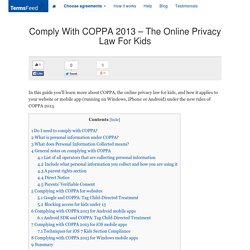
The Children’s Online Privacy Protection Act of 1998 or simply, COPPA, was enacted in 1998 to protect the privacy of children under the age of 13. It’s a US federal law and it first became effective on April 21st, 2000, with other new changes becoming effective on July 1st, 2013. This law is applicable to US businesses, but it can apply to any foreign businesses if they collect personal information from children under 13 residing in the US. COPPA is applicable if your website or mobile app (regardless if it’s available in the iOS Store, Google Marketplace or Windows Store, etc.) is: operating under US jurisdictionrunning on servers that are hosted in USoperated by businesses with headquarters located in the US territory.
Complying with COPPA: Frequently Asked Questions. (Latest revisions: FAQ H.5, H.10, and H.16 – July 16, 2014) The following FAQs are intended to supplement the compliance materials available on the FTC website.
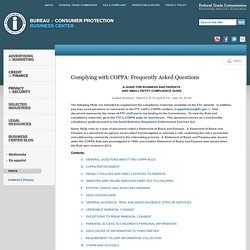
In addition, you may send questions or comments to the FTC staff’s COPPA mailbox, CoppaHotLine@ftc.gov. This document represents the views of FTC staff and is not binding on the Commission. To view the Rule and compliance materials, go to the FTC's COPPA page for businesses. This document serves as a small entity compliance guide pursuant to the Small Business Regulatory Enforcement Fairness Act. Some FAQs refer to a type of document called a Statement of Basis and Purpose. Contents: 1. Children’s Online Privacy Protection Rule: A Six-Step Compliance Plan for Your Business. When it comes to the collection of personal information from children under 13, the Children’s Online Privacy Protection Act (COPPA) puts parents in control.
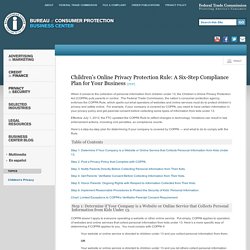
The Federal Trade Commission, the nation’s consumer protection agency, enforces the COPPA Rule, which spells out what operators of websites and online services must do to protect children’s privacy and safety online. For example, if your company is covered by COPPA, you need to have certain information in your privacy policy and get parental consent before collecting some types of information from kids under 13. Effective July 1, 2013, the FTC updated the COPPA Rule to reflect changes in technology. Violations can result in law enforcement actions, including civil penalties, so compliance counts. Here’s a step-by-step plan for determining if your company is covered by COPPA — and what to do to comply with the Rule. Table of Contents Step 2: Post a Privacy Policy that Complies with COPPA. New suite of resources can streamline COPPA compliance. Who should be in the driver’s seat when it comes to the collection of personal information online from kids under 13?
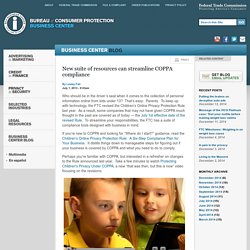
That’s easy: Parents. To keep up with technology, the FTC revised the Children’s Online Privacy Protection Rule last year. As a result, some companies that may not have given COPPA much thought in the past are covered as of today — the July 1st effective date of the revised Rule. To streamline your responsibilities, the FTC has a suite of compliance tools designed with business in mind.
Mobile apps still collect vast amounts of personal data on kids, despite FTC privacy rule. WASHINGTON - Worried that toy stores, fast food chains, and other retailers are tracking your kids online this holiday season?

A landmark 2013 law aimed at protecting the privacy of America's youngest mobile consumers hasn't stopped app developers from collecting vast amounts of data, including a person's location and even recordings of their voice, according to privacy researchers and consumer advocates. Whether mobile app developers seek parental consent first — as required by law — or pass the information on to advertisers isn't entirely clear.
But if you prefer to stay anonymous, your options are limited: Wade through each mobile app's privacy policies to make sure you are OK with the terms, or stick the phone on "airplane mode" to shut off the wireless connection and risk losing functionality. "Kids are such a lucrative market, especially for apps," said Jeff Chester, executive director of the Center for Digital Democracy. Privacy and Security. Protecting Your Child’s Privacy Online. As a parent, you have control over the personal information companies collect online from your kids under 13.
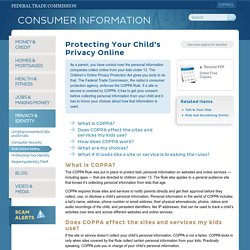
The Children’s Online Privacy Protection Act gives you tools to do that. The Federal Trade Commission, the nation’s consumer protection agency, enforces the COPPA Rule.